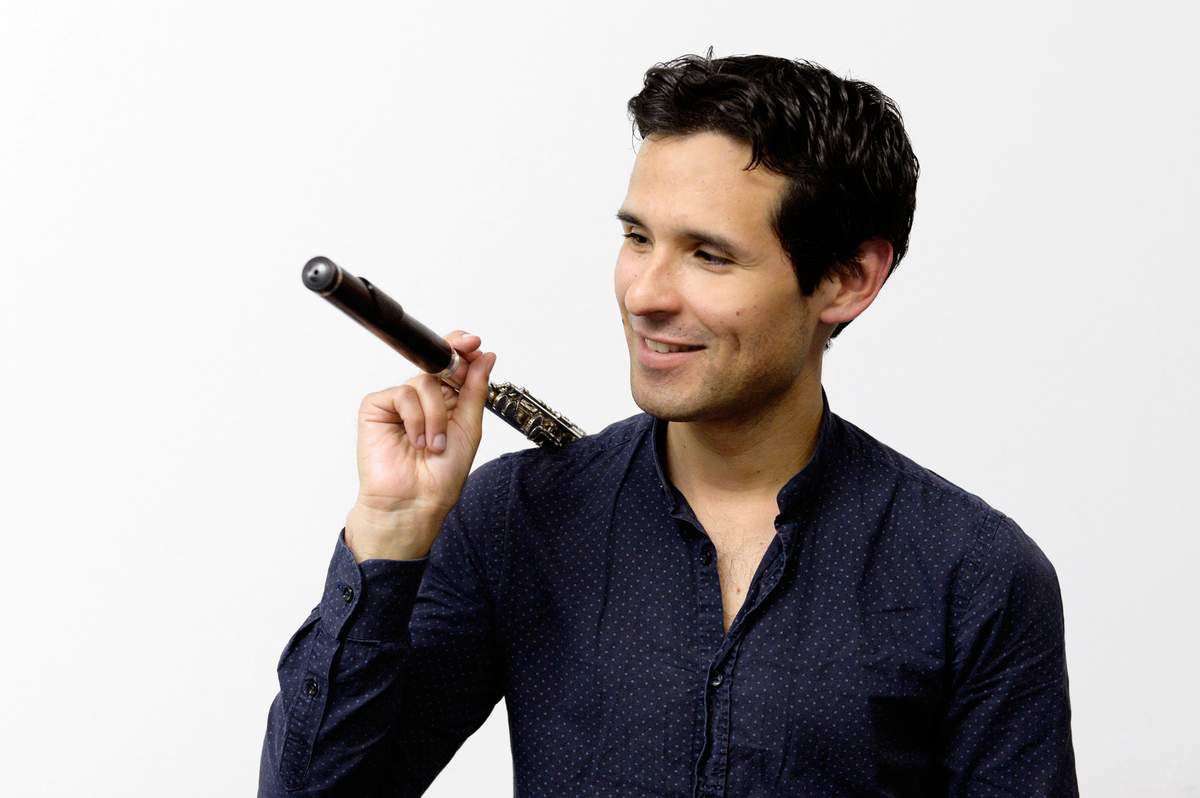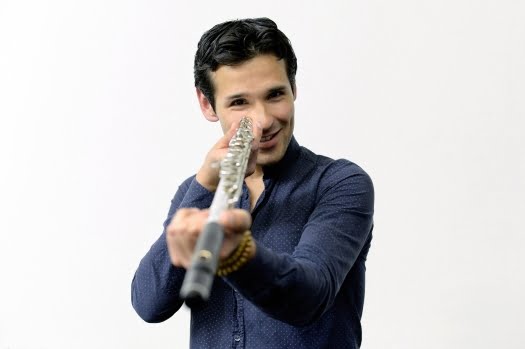Jazz interview with jazz fluteist Daniel Manrique-Smith. An interview by email in writing.
JazzBluesNews.Space: – First let’s start with where you grew up, and what got you interested in music?
Daniel Manrique-Smith: – I grew up in Lima, Peru. I started playing recorder when I was three years old. Once, when my mother overheard me playing some children’s songs on my toy piano, she thought I might have some natural talent. There were many professional classical musicians in her family, so she hired a private instructor for me. When I was about five years old I saw a traditional Peruvian flute being played on television; it’s played like a transverse flute. I pestered my parents every day, telling them that I wanted to play a flute that way. They thought I meant the classical concert flute, so my mother took me to a concert with a classical flute player and an orchestra. It was like love at first sight. Ever since then the concert flute has been the instrument for me.
JBN.S: – What got you interested in picking up the jazz flute? What teacher or teachers helped you progress to the level of playing you have today? What made you choose the flute?
DMS: – I began studying classical flute when I was nine years old, and went to the National Conservatory of Music in Lima. I played only classical music until I was almost 24 years old. While I was studying classical flute at the Conservatory for Music and Dance in Cologne, Germany, I began to play popular Latin American music from Brazil, Colombia, and Cuba with friends as a hobby. That is when I first began adapting music and improvising. I was especially interested in improvisation, and heard that there were courses in jazz flute at my conservatory. I got in touch with Michael Heupel who was teaching jazz flute there, and he invited me to a concert where he was playing with his band. I was so excited after his concert that I couldn’t sleep that night. I decided that I wanted to be able to play like him and began to prepare for the qualifying exam to study jazz. I’m still trying to play like Michael, and hope someday I will be able to do it!
JBN.S: – How did your sound evolve over time? What did you do to find and develop your sound?
DMS: – My sound has had a few key evolutions. I have a very strong classical background, and I especially like the pure tone of classical flute and the classical flute aesthetic with a lot of vibrato. But I also understand that many jazz phrasings have a “cooler” sound with very little vibrato. So that was the first evolution I made in my sound. When I began studying jazz I initially played a lot of Latin jazz, salsa, and Afro-Cuban music. I developed my tone in a way that I could play the absolute highest pitches on the flute (4th octave) because of the aesthetic of that music. Then when I began playing a lot of free jazz I incorporated a lot of alternative sounds into my playing as well, e.g. percussive sounds, multiphonics, singing and playing at the same time, singing and playing different tones, etc. But the most important step of my evolution happened when I started playing with Jin Jim. I was absolutely “rock illiterate” at that time. At our very first festival concert, my band mates were rocking like hell on stage and I had to play with more energy than I’ve ever needed in my life. I began perform, sing, and even scream when I was playing because the music and my solo demanded it. I didn’t even notice that I was screaming! And so I continue evolving, experimenting with more sounds and even beatboxing for my cadenza intros with Jin Jim.
JBN.S: – What practice routine or exercise have you developed to maintain and improve your current musical ability especially pertaining to rhythm?
DMS: – I practice a lot, spending several hours a day with my flute if I’m not touring. I do tone exercises, exercises for my fingers and technique, and then some jazz scales and material for improvisation. I practice rhythm too, of course, and in the last few years I’ve been playing along with recordings. This helps me master the odd meters we use in Jin Jim, like 7/4, 9/4 or 11/8.
DMS: – I don’t have any special preferences for harmonic patterns. I feel very comfortable with Latin jazz and flamenco, which don’t often feature complex harmonies. But I also feel comfortable with Brazilian music, which can be very sophisticated and difficult. For me, being comfortable with the musical phrasing is more important than the harmonic language of certain styles of music. For example, I’m still uncomfortable playing swing because I haven’t internalised the feeling in the same way I have for Cuban or Brazilian music. Still, I can play very modern patterns and feel comfortable.
JBN.S: – What do you love most about your new album 2018: <Jin Jim – Weiße Schatten>, how it was formed and what you are working on today.
DMS: – I love the whole album, though I do like a few pieces more than the others because of the emotional associations I have with them: “Duende” with its intro, “Mankafiza,” and “Dreaming”. “Mankafiza” is a composition from our double-bass player Ben Tai Trawinski. He wrote that tune after our 2016 African tour where we played concerts in Madagascar, Cameroon, Congo, South Africa, and Angola. That piece is the result of the experiences we had performing there and collaborating with local musicians. The music on Weiße Schatten was composed and/or arranged especially for this album. Our first album contained many pieces that were composed by our band members before Jin Jim existed as a group. This time it was different; we began with a concept for the kinds of compositions we would like to create. We wrote more pieces than we needed, and together with our producer, Siggi Loch, chose what to include on the album. Now we are working on some new pieces and performing a lot for our CD Release Tour. Next year we’ll embark on our second South American tour to Chile and Peru, so I’m working very hard organising that.
JBN.S: – What’s the balance in music between intellect and soul?
DMS: – I think it’s much easier in jazz to find that balance than in classical music. In modern jazz, the compositions are often very intellectual because musicians pursue a musical idea more than an emotion. We are composing in order to express a musical idea. Plus, when jazz musicians compose we always want to have fun performing the final piece. So we try to write music that is a challenge, but still has enough freedom to improvise in the solos. The soloist is of course thinking and adapting while listening to the other musicians, trying to communicate, and responding to interesting inputs. I will never forget something my teacher Michael Heupel once said to me: “You can play whatever you want, as long as you play your idea in a coherent way.” And he was right. So the balance between intellect and soul is maybe the balance between conscious and unconscious playing. When we improvise we have a lot of learned material and knowledge that we use when we are playing. But all the time we are listening and responding, and our ears are often faster than our brains!
JBN.S: – Please any memories from gigs, jams, open acts and studio sessions which you’d like to share with us?
DMS: – There is one concert that I will never forget. The first concert of our 2016 African tour was at “Madajazzcar,” a festival in Madagascar. We played a concert in an amphitheatre for about 3000 people. In jazz you feel like a rock star with such a large venue and audience! Plus, the spectators in Africa are very different than in Europe. When we perform in Germany, for example, we have a lot of enthusiastic reactions during our concerts because our music is very energetic. People applaud and shout, but always in the “right” moments: at the end of an intro, between solos, and after a song. But in Africa people were cheering and applauding whenever they felt it was the right time. When they heard something they liked, they showed us immediately that they liked it. That feedback gave us such amazing energy. When you play four measures of a composition and people are already cheering because they like it, you play very differently and with much more energy. It was incredible for us!!
DMS: – I think that young people can be very enthusiastic about jazz music, since it is energetic and interesting. I think that we need to try to show young people that jazz can be very cool and relevant. Part of that is connecting with young people, and being aware of how they communicate among themselves. How we “sell” jazz to young people is very important. Finland and Norway are good examples of how jazz can be cool again in youth culture.
JBN.S: – John Coltrane said that music was his spirit. How do you understand the spirit and the meaning of life?
DMS: – For me the meaning of life is to accept that life begins new every day. Life is energy, renewal, and progress. I try to bring something positive to life every day. Sometimes I just share a laugh with someone. Sometimes I use my music, trying to inspire people or other musicians. But I am always trying to teach my son how to be a good person.
JBN.S: – If you could change one thing in the musical world and it would become a reality, what would that be?
DMS: – I would love to change the way musicians help each other. I think we need much more solidarity, information exchange, and collaboration between musicians worldwide. And much less selfishness! I think all musicians would benefit from such an attitude.
JBN.S: – Who do you find yourself listening to these days?
DMS: – I’m listening to some new tracks from my friend Diego Piñera, a very talented Uruguayan drummer. I’m also enjoying some of the new timba tunes from Climax, a band from Cuba. Also some modern jazz and some Latin. But I never know what I will listen to tomorrow, or even later today!
JBN.S: – Let’s take a trip with a time machine, so where and why would you really wanna go?
DMS: – I am very happy with the time I was born. Maybe I’d choose to travel 100 years into the future to learn something new and to see my son’s future.
JBN.S: – I have been asking you so far, now may I have a question from yourself…
DMS: – Well after all these questions I would like to know what kind of music you listen to and if you play any instruments yourself!
Interview by Simon Sargsyan







More Stories
Interview with Janis Siegel of The Manhattan Transfer: Jazz, being a more refined, interpreted form of music
CD review: George Benson – Dreams Do Come True: When George Benson Meets Robert Farnon – 2024: Video, CD cover
The band was tight as ever. The Warren Haynes Band cuts loose: Video, Photos